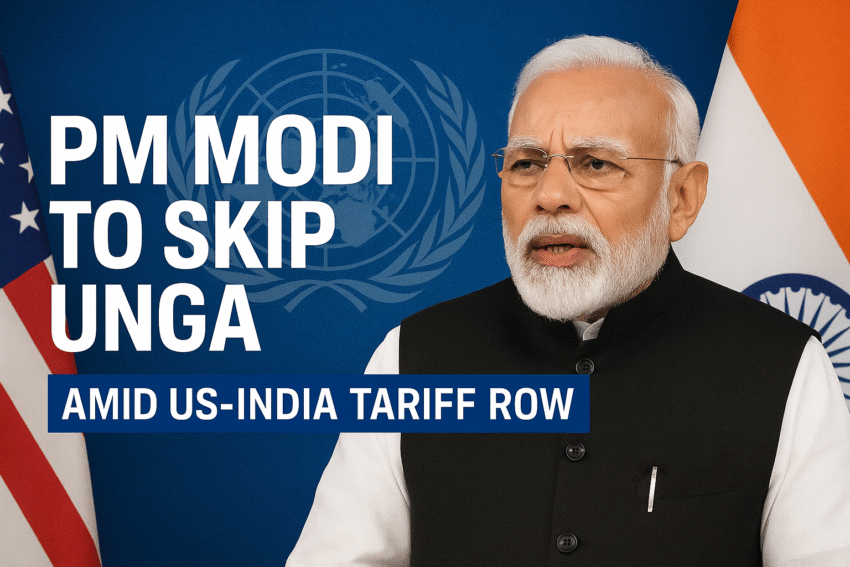In a significant diplomatic development, Prime Minister Narendra Modi will not address the United Nations General Assembly (UNGA) in New York later this month. The decision comes amid the escalating US-India tariff row, a dispute that has cast a shadow on bilateral relations between Washington and New Delhi.
US-India Tariff Tensions Escalate
The trade standoff between India and the United States has intensified in recent months after former U.S. President Donald Trump reimposed punitive tariffs of up to 50% on Indian exports. The move followed Washington’s criticism of India’s continued oil trade with Russia.
Trump’s adviser, Peter Navarro, further worsened tensions by accusing Indian groups of “profiteering,” a remark that India swiftly rejected as misleading and inaccurate. The US-India tariff row has since become a central issue in the evolving trade and diplomatic narrative.
Modi’s Absence at UNGA
Traditionally, Indian Prime Ministers have used the UNGA platform to outline India’s global vision, address security challenges, and reinforce its role as a voice for the Global South. Modi himself has delivered several high-profile speeches at the UN in the past, highlighting India’s leadership in climate change, technology, and multilateralism.
This year, however, Modi’s absence is telling. While the Ministry of External Affairs (MEA) has not officially linked his decision to the tariff conflict, diplomatic observers suggest that the US-India tariff row may have influenced scheduling choices and political signaling.
Diplomatic Priorities at Play
Officials in New Delhi have emphasized that Modi’s focus this month will be on strengthening partnerships in Asia and the Global South rather than engaging in what they see as an increasingly contentious debate in New York.
“India remains committed to multilateralism and the United Nations. However, the Prime Minister’s current priorities involve advancing strategic and economic partnerships closer to home,” a senior official noted.
This shift reflects India’s broader approach: while maintaining strong ties with the U.S., it is simultaneously asserting its autonomy in global decision-making, especially on trade and energy security.
Opposition and Domestic Reactions
Opposition leaders have been quick to react, with some arguing that Modi’s decision reflects a shrinking global space for India under his leadership. Others, however, view the move as a pragmatic choice—avoiding a platform where uncomfortable questions about tariffs, Russia ties, and trade imbalances might dominate.
Among business leaders and industry associations, there is growing concern. India’s export-driven sectors, particularly textiles, chemicals, and IT services, are already feeling the pinch of higher tariffs. The Confederation of Indian Industry (CII) has urged the government to seek dialogue with Washington to prevent long-term damage.
Washington’s Position
From Washington’s perspective, the tariffs are intended to pressure India into aligning more closely with U.S. sanctions on Russia and revisiting what it sees as “unfair trade practices.” Trump’s rhetoric has painted India as benefiting disproportionately from American markets while undercutting U.S. strategic goals.
Yet many U.S. lawmakers, particularly those focused on Indo-Pacific strategy, have cautioned against alienating India. They argue that the US-India tariff row undermines broader security cooperation in countering China’s rise.
India’s Balancing Act
India, meanwhile, has defended its trade policies as driven by national interest. The MEA has reiterated that India’s oil imports from Russia are part of its strategy to secure affordable energy for its citizens. At the same time, New Delhi continues to engage the U.S. on defense cooperation, technology partnerships, and climate initiatives.
By not attending the UNGA this year, Modi is signaling that India will not be pressured into altering its policy choices under international scrutiny. Instead, India appears to be doubling down on its role as a self-reliant global player, willing to face short-term trade friction for long-term strategic autonomy.
Global Implications
Modi’s absence will be noted by the international community, especially developing nations that often look to India’s UNGA speeches for leadership on issues like climate finance, digital equity, and South-South cooperation.
However, analysts believe External Affairs Minister S. Jaishankar will likely represent India at the UNGA, ensuring continuity of presence while avoiding direct confrontation at the top leadership level.
Conclusion
The decision not to address the UNGA underscores the seriousness of the ongoing US-India tariff row and its ripple effects on global diplomacy. For India, the choice reflects both caution and confidence—a willingness to forgo the spotlight in New York to assert autonomy in foreign policy.
While Modi’s absence may temporarily leave a gap at the UN stage, it also highlights a broader truth: India’s global engagement today is defined less by ceremonial speeches and more by hard negotiations on trade, security, and strategic independence.

